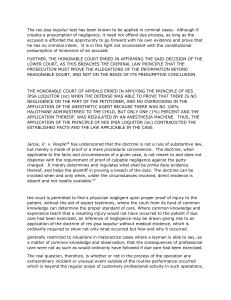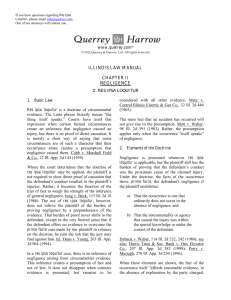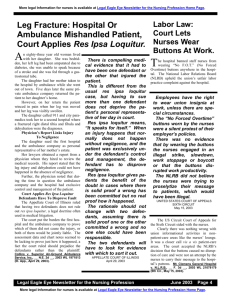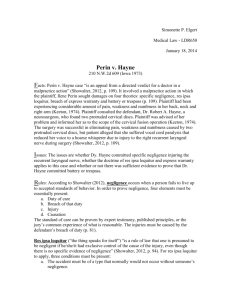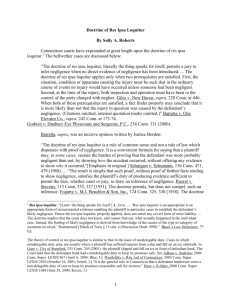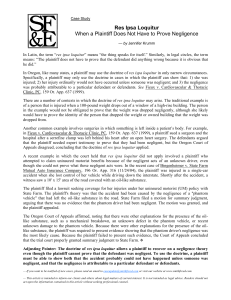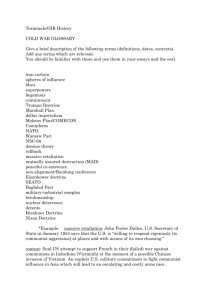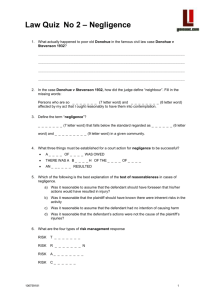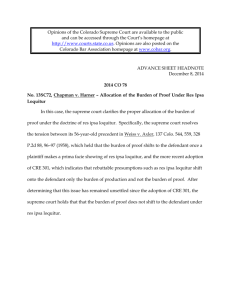Legal Briefs - American Association of Nurse Anesthetists
advertisement
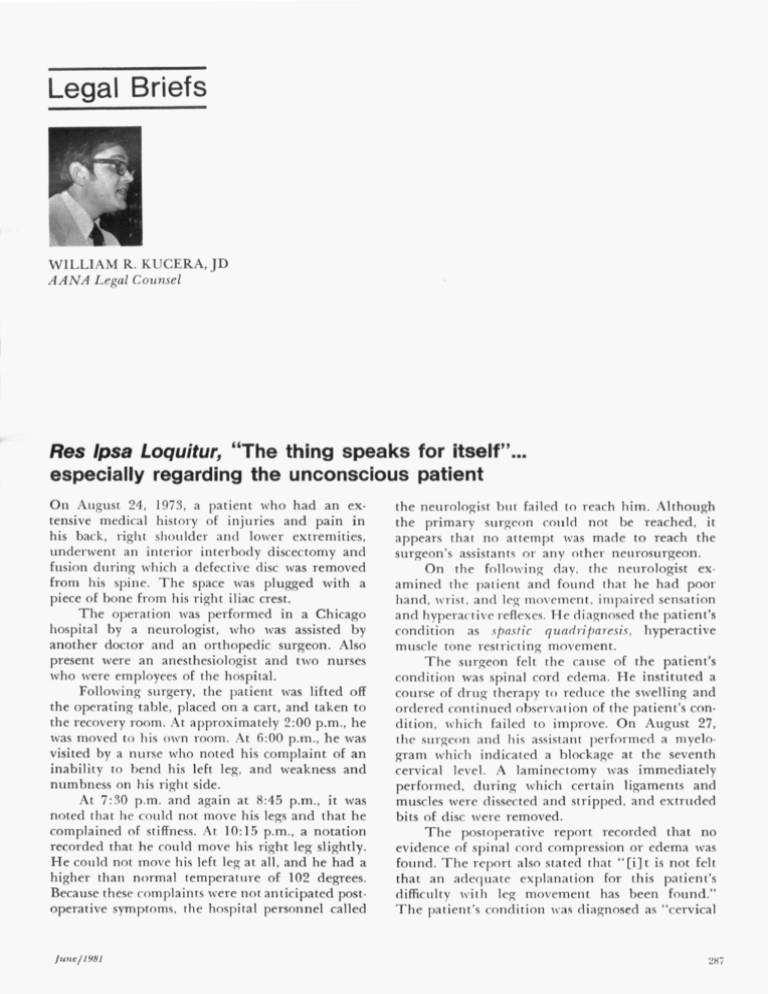
Legal Briefs WILLIAM R. KUCERA, JD AANA Legal Counsel Res Ipsa Loquitur, "The thing speaks for itself"... especially regarding the unconscious patient On August 24, 1973, a patient who had an extensive medical history of injuries and pain in his back, right shoulder and lower extremities, underwent an interior interbody discectomy and fusion during which a defective disc was removed from his spine. The space was plugged with a piece of bone from his right iliac crest. The operation was performed in a Chicago hospital by a neurologist, who was assisted by another doctor and an orthopedic surgeon. Also present were an anesthesiologist and two nurses who were employees of the hospital. Following surgery, the patient was lifted off the operating table, placed on a cart, and taken to the recovery room. At approximately 2:00 p.m., he was moved to his own room. At 6:00 p.m., he was visited by a nurse who noted his complaint of an inability to bend his left leg, and weakness and numbness on his right side. At 7:30 p.m. and again at 8:45 p.m., it was noted that he could not move his legs and that he complained of stiffness. At 10:15 p.m., a notation recorded that he could move his right leg slightly. He could not move his left leg at all, and he had a higher than normal temperature of 102 degrees. Because these complaints were not anticipated postoperative symptoms, the hospital personnel called June/1981 the neurologist but failed to reach him. Although the primary surgeon could not be reached, it appears that no attempt was made to reach the surgeon's assistants or any other neurosurgeon. On the following day, the neurologist examined the patient and found that he had poor hand, wrist, and leg movement, impaired sensation and hyperactive reflexes. He diagnosed the patient's condition as spastic quadriparesis, hyperactive muscle tone restricting movement. The surgeon felt the cause of the patient's condition was spinal cord edema. He instituted a course of drug therapy to reduce the swelling and ordered continued observation of the patient's condition, which failed to improve. On August 27, the surgeon and his assistant performed a myelogram which indicated a blockage at the seventh cervical level. A laminectomy was immediately performed, during which certain ligaments and muscles were dissected and stripped, and extruded bits of disc were removed. The postoperative report recorded that no evidence of spinal cord compression or edema was found. The report also stated that "[i]t is not felt that an adequate explanation for this patient's difficulty with leg movement has been found." The patient's condition was diagnosed as "cervical myelopathy," an impaired function of the cervical spinal cord. The patient lost the use of his limbs and is a quadriplegic. The patient and his wife filed a complaint on August 9, 1974, claiming damages for injuries suffered by reason of the alleged negligence of defendants, (the neurologist, his assistant and the orthopedic surgeon.) The hospital was sued in separate counts based on the doctrine of res ipsa loquitur. The complaint sought respectively, $5 million dollars for the patient's pain and injuries, and $5 million dollars for his wife's loss of his consortium and services. After evidentiary depositions and affidavits were submitted, the Circuit Court of Cook County granted the hospital's Motion for Summary Judg- ment. The patient and his wife appealed the Circuit Court's judgment to the Appellate Court of Illinois, First District, which reversed the Circuit Court's decision. The hospital then appealed to the Supreme Court of Illinois, which affirmed the judgment of the Appellate Court. Kolakowski v. Voris, 415 N.E.2d 397, Supreme Court of Illinois (1980). Proof of negligence by circumstantial evidence The plaintiff's complaint against the hospital was brought under the doctrine of res ipsa loquitur which roughly translates into "the thing speaks for itself." This doctrine permits the jury to draw the conclusion, from the occurrence of an unusual event, that it happened through the defendant's fault. Under this doctrine the happening itself affords reasonable evidence, in the absence of explanation by the defendants, that the occurrence as such would not have happened in the ordinary course of things if the person charged with negligence had used proper care. In essence, the purpose of the res ipsa doctrine is to allow proof of negligence by circumstantial evidence when the direct evidence concerning the cause of injury is primarily within the knowledge and control of the defendant (s). Whether the doctrine applies in a given case is a question of law which must be decided by the court, but once this has been answered in the affirmative, it is for the trier of fact (the jury) to weigh the evidence and determine whether the circumstantial evidence of negligence has been overcome by the defendant's proof. The burden of evidence shifts In effect, the doctrine of res ipsa loquitur shifts the evidentiary burden from the plaintiff to 288 the defendant. Once the doctrine is ruled to be applicable, the plaintiff need not introduce any further specific evidence of cause and effect and could choose to rely on the circumstantial inference established by the doctrine itself. The circumstantial inference must he charged to the jury. The defendant is charged with the burden of producing evidence which will overcome this inference and convince the jury that the injurious occurrence was not the result of defendant's negligence. The doctrine, therefore, helps the plaintiff overcome two difficulties often encountered in medical malpractice cases: (1) the inability to obtain favorable expert testimony, and (2) the inability to explain the events causing injury and to prove specific acts of negligence by the defendant (s). The factor which affords the Kolakowrski decision its vibrancy is the requirement that, in order for the doctrine of res ipsa loquitur to apply, not only must the occurrence itself be such that would not ordinarily occur in the absence of negligence, but also that the event or occurrence must have been caused by an agency or instrumentality within the exclusive control of the defendant. The hospital contended that nothing within the record before the Court raised an issue as to whether anything under its control, or any failure on its part to use proper care, could have caused the patient's condition. The hospital argued that the plaintiff was not entitled to rely on the res ipsa loquitur doctrine because he was never in the exclusive control of the hospital. Attorneys for the hospital pointed out that at the time of the operation, the patient was also under the control of the operating surgeons who were not agents or employees of the hospital. Thus, the hospital argued that even if the untoward result which befell the patient would not ordinarily occur in the absence of negligence, the circumstances would not permit the inference that the negligence was that of the hospital, as distinquished from that of the surgeons who performed the operation. The Supreme Court of Illinois clearly did not agree with the hospital's argument. The Court cited the landmark decision of the Supreme Court of California, reached some 36 years prior in Ybarra v. Spangard, 25 Cal.2d 486, 154 P.2d 687 (1944).There, it was similarly argued that since the patient was under the care of a number of persons, some of whom were not employees or agents of the hospital, the element of control necessary for the application of the doctrine of res ipsa loquitur was absent. The Ybarra Court's Journal of the American Association of Nurse Anesthetists decision acknowledged the presence of res ipsa loquitur, however; and that reasoning was the basis for the Supreme Court of Illinois' statement: "The present case is of a type which comes within the reason and spirit of the res ipsa doctrine more fully perhaps than any other . . . [I]t is difficult to see how the doctrine can, with justification, be so restricted in its statement as to become inapplicable to a patient who submits himself to the care and custody of doctors and nurses, is rendered unconscious, and received some injury from instrumentalities used in his treatment. Without the aid of the doctrine a patient who received permanent injuries of a serious character, obviously the result of someone's negligence, would be entirely unable to recover unless the doctors and nurses in attendance voluntarily chose to disclose the identity of the negligent person and the facts establishing liability." The decision and its impact The Illinois Supreme Court determined that in the case before it, the patient was placed in the care and custody of the named defendants at the time of the alleged injury. Since the patient was under a general anesthetic during surgery, he was unable to determine the precise cause of his injuries; the cause was thus held to be within the exclusive knowledge of the defendants. Under these circumstances the Court held that the plaintiff's only recourse was to rely on the doctrine of res ipsa loquitur. The Court ruled that the hospital's "exclusive control" argument was manifestly unfair because the physicians and the hospital exercised concurrent control over the operation and each owed an independent duty to the patient. The holding in Kolakow1ski is a profound one June/I981 indeed for the hospital and medical communities. Under this decision, whenever a patient submits himself to the care of a hospital and its staff and is rendered unconscious for the purpose of surgery to be performed by independent contracting surgeons, the control necessary under res ipsa loquitur will have been met. In a properly pleaded case, the burden will then shift to the hospital to dispel the inference that it exercised the control necessary to the application of the doctrine. Of course, the doctrine of res ipsa loquitur merely raises a presumption of negligence which operates only to shift the burden of evidence to the hospital. It is entirely possible that the defendant (s) will be capable of producing evidence sufficient to convince the jury that the patient's resultant condition was not caused by the negligence of the hospital or other named defendants and thereby overcome the inference of negligence. In this manner, the defendant-physicians or hospital can protect themselves from cases of bad results or failure to cure alone, and need not be held to be a warrantor of cures. However, the significance which the doctrine of res ipsa loquitur has on both the ability and proclivity of plaintiffs to establish a cause of action, and the significance of the Kolakorwski decision in establishing the doctrine's applicability in all well pleaded cases when the patient is rendered unconscious for the purpose of surgery, must be appropriately recognized for the precedent established. The operating room has thus been transformed into a significantly more sensitive place in which to practice, and those who anesthetize or perform surgery upon patients or those who assist in either of the aforementioned activities should heed the notice advanced in the Kolakowski decision. 28!)
